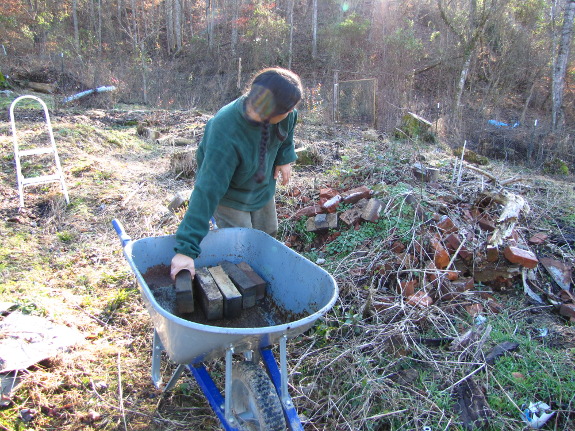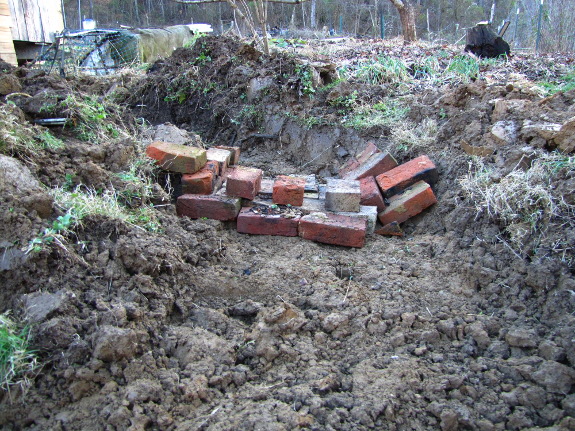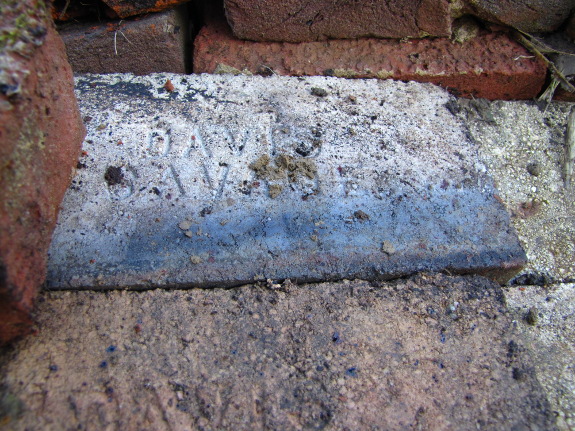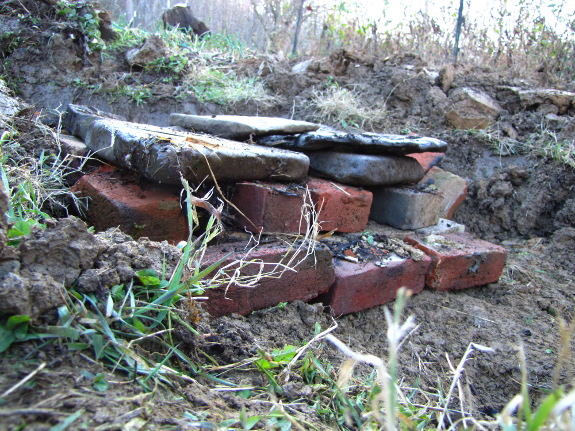
Greywater wetland inlet

The inlet of a greywater
wetland can be
trouble if you don't plan carefully. This is where the most tasty
(from a dog's point of view) gunk is going to land, so you want to
close it in to prevent nibbling. Water will also be gushing out
of the pipes with quite a bit of force here, so it's handy to make a
solid bottom in this area to prevent erosion.
There are lots of
designs for greywater inlets, but I wanted to work with what I have on
hand --- bricks
from the old chimney.
I loaded up a wheelbarrow full of the best ones and brought them down
to my budding wetland.

The pipes aren't in
place yet, but they'll be bringing water in from the top-left side of
the picture above. I simply laid bricks loosely on the ground and
put a few on the downhill side to further break up the flow.

I'd been saving these
fire bricks since they hold their shape much better in freezing, wet
conditions than the bricks that made up the bulk of the chimney.
I assume "Davis Savage," which is stamped on each fire brick, refers to
some long-ago local brick manufacturer. I only had enough fire
bricks to coat the bottom of the inlet, but that'll probably be the
spot that stays wet longest and will need to be strongest.

Some river rocks laid
loosely on top may or may not be enough to keep Lucy out. We'll
have to wait and see. I can hardly wait until these bricks moss
over and the greywater trickles down them like a tiny waterfall.
(Can you tell building
the greywater wetland is the most fun I've had all year?)
Want more in-depth information? Browse through our books.
Or explore more posts by date or by subject.
About us: Anna Hess and Mark Hamilton spent over a decade living self-sufficiently in the mountains of Virginia before moving north to start over from scratch in the foothills of Ohio. They've experimented with permaculture, no-till gardening, trailersteading, home-based microbusinesses and much more, writing about their adventures in both blogs and books.
Want to be notified when new comments are posted on this page? Click on the RSS button after you add a comment to subscribe to the comment feed, or simply check the box beside "email replies to me" while writing your comment.

keep in mind that bricks may disintegrate in water especially if they freeze and thaw. older bricks are more likely to do this.
tammy --- You'll notice I carefully picked out the fire bricks to go on the bottom, where they'll have the most sustained time in water. These bricks seem much more resilient in dealing with the elements.
Tom --- We live in a very wet climate, so it actually doesn't make sense to try to irrigate with our greywater. We may eventually hook up rain barrels to our currently-halfway-constructed gutters to catch rainwater for irrigation, but even there it seems a lot easier to expend a little energy to pump water out of the creek when we need it.
Rena --- We live next door to a swamp already, but mosquitoes are extremely minimal due to the bats and dragonflies we encourage. I don't think our wetland will cause any extra problems, especially since the goal is to have water soak into the ground in less than 24 hours, which won't give larvae time to develop. As for the foundation --- we don't have one, since we live in a trailer. But this is all downhill from the trailer, and part of the goal is to channel roof runoff away from our living zone too, so it should help with water problems rather than hurt.
But this is all downhill from the trailer, and part of the goal is to channel roof runoff away from our living zone too, so it should help with water problems rather than hurt.
Bricks do not necessarily disintegrate in water. The brick-built castle below (slot Loevestein) has been sitting in the water for 650 years now.